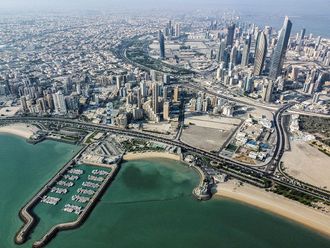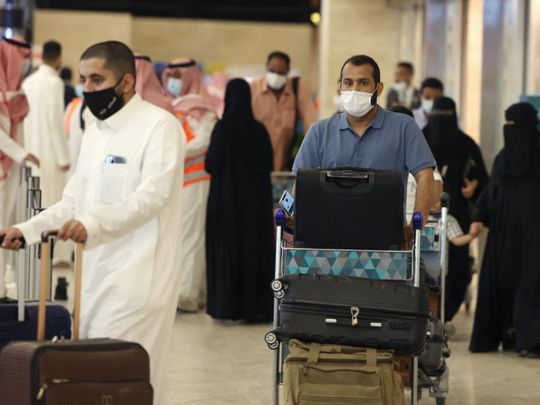
Cairo: Experiencing a significant decline in COVID-19 infections after weeks of spikes, several Gulf countries have relaxed restrictions earlier prompted by the global pandemic.
The relaxation in movement and travel curbs has revived hopes that life will return to normal while caution against the highly contagious ailment is not thrown to the wind.
The following is a glimpse at how the existing epidemiological situation in the member states of the Gulf Cooperation Council (GCC).
Saudi Arabia
Since February 1, Saudi Arabia, the largest and most populous Gulf country, has made obtaining a booster shot against COVID-19, mandatory for maintaining the status of full immunisation shown on the health app “Tawakkalna” for everyone aged 18 and above who got the second dose eight months ago.
Full immunisation is mandatory for accessing public and private institutions in the kingdom.
Responding to a mass exodus from Ukraine, Saudi civil authorities Monday announced cancelling pre-arrival PCR tests for citizens and their foreign escorts who return from the East European state.
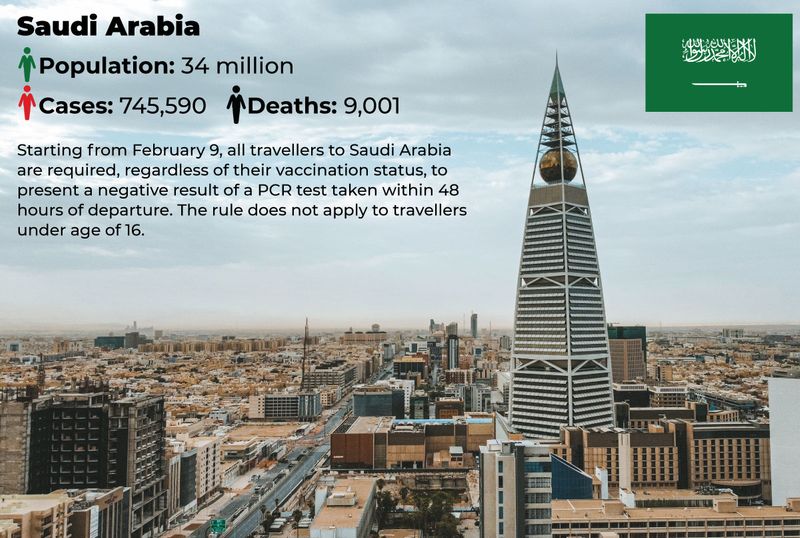
The Saudi General Authority of Civil Aviation (GACA) has issued instructions to airlines to exempt from the PCR tests the Saudi citizens and their non-Saudi dependents coming from Ukraine.
GACA added that PCR tests for those people will be conducted within 48 hours after arrival in the kingdom.
Saudi citizens are required to take the booster shots to travel abroad. The jabs can be obtained three months after getting the second dose of a vaccine.
In a sign of easing the virus-related restrictions, Saudi authorities earlier this week lifted an age cap on entering the two holy mosques in Mecca and Medina.
The Ministry of Hajj and Umrah said Saturday that there is no age requirement for Umrah [lesser pilgrimage] to enter both holy sites. However, worshippers continue to get an entry permit via the app “Eatmanara” that obligates them to have their health status as “immune” in the app “Tawakkalna”.
Requirements to wear face masks and observe physical distancing while inside the Grand Mosque in Mecca and the Prophet’s Mosque in Medina, reintroduced last December, are still in force.
In January, the Ministry of Hajj and Umrah said a decision restricting repetition of Umrah to a 10-day gap also applies to overseas Muslims.
Pilgrims arriving from abroad are allowed to stay in Saudi Arabia for 30 days and have to meet certain requirements including showing status of immunization “Tawakkalna”.
Based on the 10-day interval for repeating Umrah, the overseas Muslims could undertake the rituals three times at most during their 30-day stay.
The ministry attributed the decision to restrict Umrah repetition to precautions against COVID-19 reimposed at the two holy mosques.
In October 2020, Saudi Arabia resumed Umrah after about seven months of suspension due to COVID-19.
Citing a downward infection trend, the Saudi Health Ministry announced Tuesday 563 new virus cases and three related fatalities, raising the kingdom’s overall infections and deaths to 745,590 and 9,001 respectively.
Over 61 million doses of vaccination against COVID-19 have been administered in the kingdom so far, the ministry said on Tuesday.
Kuwait
Last month, the Kuwaiti government lifted most anti-coronavirus restrictions and relaxed travel curbs after a marked drop in infection rates in the country of around 4.6 million people.
Accordingly, unvaccinated people are allowed to enter malls, cinemas and theatres provided they present a negative PCR result. Social gatherings inside indoor and outdoor places and full capacity of public transport are also allowed in compliance with health requirements. Physical distancing among worshippers at mosques has been cancelled.
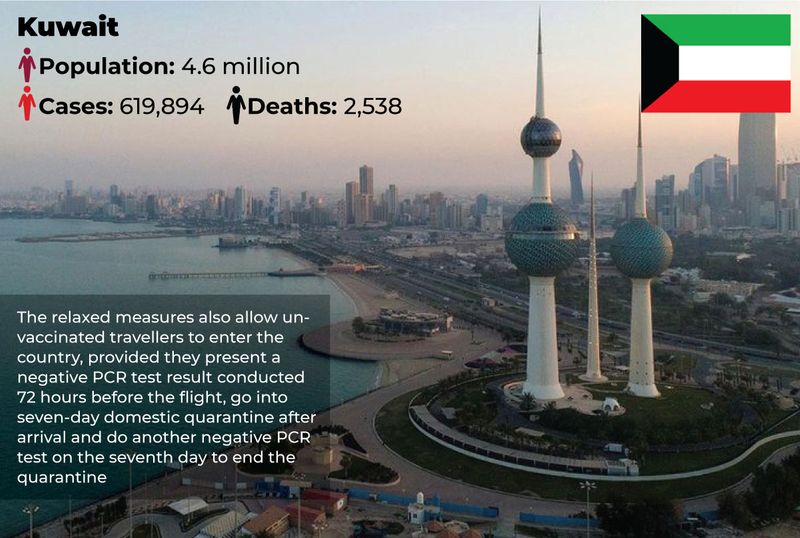
The fully vaccinated travellers, including those who obtained two doses of vaccination less than nine months ago and those who received the booster shots against COVID-19, are exempted from pre-arrival and on-arrival PCR tests as well as home quarantine.
The travel measures and exemptions from the PCR testing apply to Kuwaiti and expatriate travellers.
Health authorities Monday reported 584 new virus cases in the past 24 hours, Kuwait’s lowest since January 1. One coronavirus-related fatality was also confirmed. The latest figures bring the total infections in Kuwait to 619,894 while the overall deaths reached 2,538.
Qatar
Starting from Monday, Qatar applied a relaxed travel and return policy exempting its vaccinated citizens and foreign residents from pre-arrival PCR testing after a steady decline in COVID-19 infection rates in the country.
Exempted from the requirement are Qatari citizens and foreign residents who have been fully vaccinated regardless of their departure countries.
Anti-virus vaccines recognised by Qatar are BioNTech, Moderna, AsraZeneca and Johnson & Johnson, while the conditionally approved vaccines are Sinopharm, Sinovack, Sputnik and Covaxin.
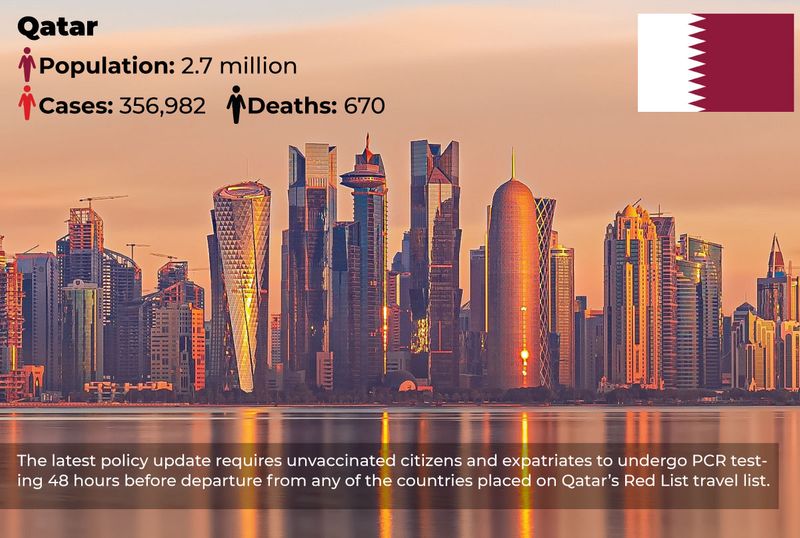
Non-residents of Qatar are required to register via a pre-registration system on www.ehteraz.gov.qa website and upload all relevant documents such as vaccine certificates at least three days before arrival.
Although pre-registration is optional for Qatar’s citizens and foreign residents, all individuals heading to the country are recommended to pre-register to facilitate their entry procedures upon arrival.
Last month, Qatar eased coronavirus-related restrictions inside the country.
Accordingly, the obligatory wearing of face masks in open areas was scrapped while caps on allowed gatherings went up. That said, people are required to only wear face masks in indoor places including mosques, education institutions and hospitals.
A maximum of 150 fully vaccinated persons and 20 unvaccinated others at most are now allowed to be present inside an indoor wedding hall. The number rises to a maximum of 300 vaccinated persons and 50 unvaccinated others at an outdoor hall.
Commercial centres are, meanwhile, allowed to reoperate at full capacity with all people, including the unvaccinated, are allowed entry.
Restaurants and cafes, issued the “Clean Qatar” certificate, are also allowed to operate at their full capacity in open-air areas and 75 per cent of their capacity indoors.
Other restaurants and cafes are allowed to operate at half of normal capacity in open areas and 40 per cent indoors, provided all customers have been fully vaccinated. Children under 12 years are allowed to get access to these places escorted by their families only.
Qatar, a country of around 2.7 million people, has so far confirmed a total of 356,982 virus cases and 670 related deaths.
Oman
As of Tuesday, March 1, it is no longer obligatory in Oman to wear the face mask outdoors as part of a raft of measures loosening anti-coronavirus restrictions in the sultanate. However, wearing the mask remains mandatory in closed spaces. Other measures, issued by a state supreme committee in charge of tackling the virus, include allowing hotels to reoperate at full capacity, and return to full in-person classes at all educational stages beginning March 6.
Organisers of conferences and exhibitions as well as popular activities are, however, required to continue to operate at a maximum of 70 per cent of the normal capacity while abiding by health precautions.
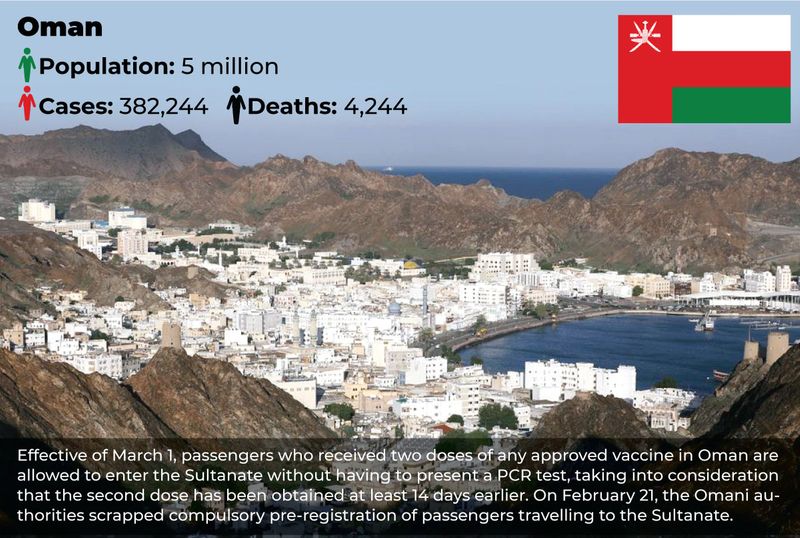
The approved vaccines in Oman are Pfizer/ BioNTech, Oxford Astrazeneca, Covishield AstraZeneca, Sputnik, Sinovac, Moderna and Sinopharm, or a single dose of Johnson & Johnson.
On February 21, the Omani authorities scrapped compulsory pre-registration of passengers travelling to the Sultanate.
Oman, a country of about 5 million people, has so far recorded a total of 382,244 coronavirus cases and 4,244 related deaths.
Bahrain
As of February 15, Bahrain has scrapped most anti-virus restrictions on people’s movement and gatherings.
The latest measures give vaccinated and unvaccinated people access to different businesses and activities. Accordingly, people are no longer required to show their green status proving they are fully vaccinated.
In the same vein, workplaces as well as indoor businesses such as malls, restaurants, coffee shops, and convention halls are allowed to operate at full capacity. Moreover, places of worship, including mosques, are open to full capacity without the requirement to observe physical distancing. However, wearing face masks in indoor places remain mandatory.
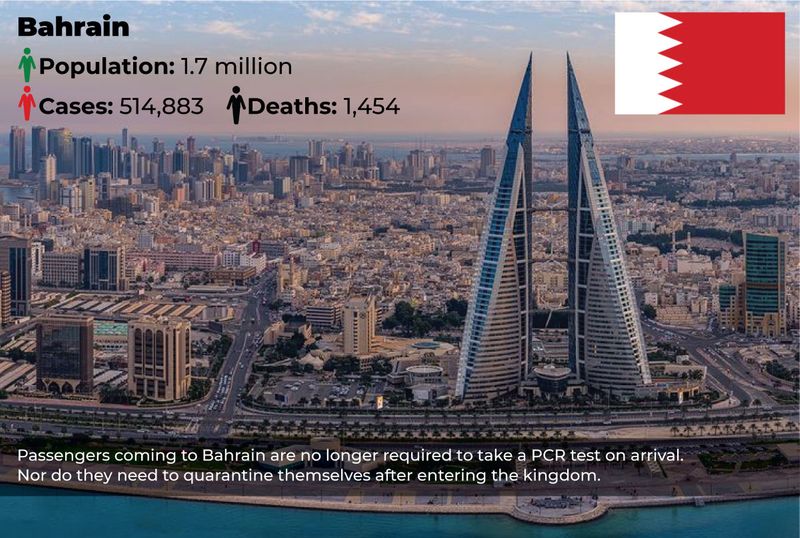
People who have had contact with active COVID-19 patients, including those who do not have a “Green Shield” on their BeAware app, no longer have to be quarantined.
Bahrain, a country of around 1.7 million people, so far has reported a total of 514,883 virus cases and 1,454 related deaths.







